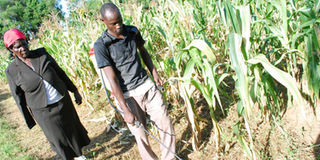Conservation farming set to improve yields from crops

PHOTO | ISAAC WALE Farmer Rosemary Oganga of Kakum village in Siaya county watches a worker, Joseph Lokhale, spray a cornfield to kill weeds.
What you need to know:
- System involves use of eco-friendly chemicals to root out unwanted plants instead of the traditional and costly weeding
The yields from Rosemary Oganga’s one acre-farm in Siaya County have increased from almost nothing to four bags even though she did not have to till the farm or use fertilisers.
She is among several other farmers in western Kenya who benefited from conservation agriculture through which growers suppress weeds using an environmentally-friendly chemical instead of traditional weeding.
A novel technology being funded in Kenya by the Australian Government and implemented by Kenya Agriculture Research Institute (Kari) with focus on the eastern and western regions, conservation farming has seen a considerable increase in output per acre and cut production costs.
“I could spend well over Sh10,000 in preparing my small piece of land and purchase of fertiliser and seeds but I would be lucky to harvest half a bag of maize,” said Ms Oganga.
Bungoma and Siaya counties are the focal points where the project is being implemented. These areas have mainly small scale farmers and pockets of large scale producers.
Dr George Ayaga, deputy director Kakamega Kari centre cum project site coordinator said the initiative will be rolled out to other parts of the country in the long run.
Impressive results
Kenya is among several Comesa partner states where the technology is spreading. Tanzania, Mozambique and Malawi embraced conservation agriculture relatively earlier and the results have been impressive, according to Dr Ayaga.
As opposed to the traditional ploughing method, the technology keeps the farm moist through retention of crop residues that also prevent soil erosion.
“The technology focuses mainly on sustainable production of crops under intensive cultivation of land where two crops, a legume and a cereal are inter-cropped twice a year,” said Dr Ayaga adding that maize and beans do well in the region.
Farmers who have used roundup herbicide on their farms said the chemical is lethal to weeds. “Nonetheless, you ought to be very careful when applying so that the crops are not affected,” said Ms Oganga during a demonstration on her farm.
The chemical allows farmers to grow crops with minimal tillage. Use of organic manure as opposed to artificial fertiliser is important in boosting soil fertility.
Mr Aloise Ndienge, a research technician from the International Centre for Insects Physiology Entomology (Icipe) said moist soils that remain un-disturbed with the conventional method of land preparation is a recipe for good yields to the farmer all seasons.
“Besides reduced production costs, a farmer will find this technology time saving and less rigorous,” he said.
Mr Benson Nyakundi, a technical person attached to Sustainable Intensification of Maize-Legume Systems for Food security in Eastern and Southern Africa project at Kari, Kakamega told farmers to inter-crop for moisture conservation.
“We equally advise farmers to be extra careful while applying the roundup herbicide because it has a scorching effect once it comes into contact with maize or beans, however it has no effect whatsoever on the soils,” said Dr Michael Akhwale from Kari Kakamega.
Need not worry
Growers whose farms are infested with striga weed need not worry as well as use of the roundup herbicide takes care of it in addition to keeping away pests such as the stalk borer that mainly affects maize.
Conservation agriculture comes hot on the heels of a food crisis and dwindling fortunes for maize farmers in Western Kenya following an outbreak of a deadly disease that wiped out the crop last season.




